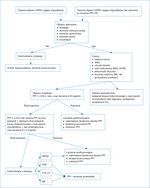Abstract
Does the choice of an appropriate therapeutic strategy determines the successfulness of GERD treatment?
For years, the management of gastroesophageal reflux disease (GERD) has been of interest to both primary care physicians and specialists. Despite the expanding range of antisecretory medications, there is still room for improvement in terms of the success rate of treatment of this seemingly trivial disease and related extra-esophageal complications. According to literature data, some patients are not fully satisfied with treatment results and require more intensive or modified management, however, there are currently no specific guidelines in this respect. The existing trend is to use greater doses of drugs that inhibit gastric secretion (proton pump inhibitors, PPIs) and to include other classes of drugs, e.g. prokinetics or topical drugs (step-up regimen), however, this procedure is often observed to be ineffective in that it fails to provide relief from symptoms or to prevent a relapse. In the age of safe prokinetic agents (e.g. itopride), it seems reasonable to modify the approach, i.e. to start therapy with intensive treatment until relief from symptoms is achieved, which should be followed by gradual reduction of drug doses (step-down regimen). Such an approach also helps to improve well-being and allows reducing the dosing regimen of secretion-inhibiting drugs during the COVID-19 pandemic, which is recommended due to the worse course of the disease in patients treated with PPIs, without affecting the susceptibility to the infection. At present, there are no new studies comparing both strategies, however, there are enough good randomized trials that support the combined use of PPIs and prokinetics with the aim of improving GERD treatment outcomes.
Piśmiennictwo
1. Chen J, Brady P. Gastroesophageal reflux disease: pathophysiology, diagnosis, and treatment. Gastroenterol Nurs 2019;42(1):20-8
2. Inadomi JM, McIntyre L, Brnard L, et al. Step-down from multiple- to single-dose proton pump inhibitors (PPIs): a prospective study of patients with heartburn or acid regurgitation completely relieved with PPIs. Am J Gastroenterol 2003;98(9):1940-4
3. Mine S, Iida T, Tabata T, et al. Management of symptoms in step-down therapy of gastroesophageal reflux disease. Gastroenterol Hepatol 2005;20(9):1365-70
4. Waleed FE, Samya AF, Hanaa F, et al. Virtue of adding prokinetics to proton pump inhibitors in the treatment of laryngopharyngeal reflux disease: prospective study. Journal of Otolaryngology – Head & Neck Surgery 2011;40(4):350-6
5. Pradeep KBT, Mamatha KR, Nagesh NS, et al. A comparative prospective study to assess the clinical efficacy and safety of pantoprazole monotherapy versus pantoprazole and itopride dual therapy in patients with gastroesophageal reflux disease in a tertiary care hospital. https://www.researchgate.net/publication/308598662. doi: 10.18203/2319-2003.ijbcp20163218
6. Chen L, Bai B, Song, et al. Clinical curative effect observation and nursing experience of treatment of gastroesophageal reflux disease with esomeprazole combined with itopride. Acta Medica Mediterranea 2016;32:1173
7. Rahul K, Balbir S, Priyamvada S. Comparative evaluation of itopride and domperidone in gastroesophageal reflux disease. International Journal of Basic & Clinical Pharmacology 2014;3(3). doi: 10.5455/2319-2003.ijbcp20140604
8. Lee SW, Ha EK, Yeniova AÖ, et al. Severe clinical outcomes of COVID-19 associated with proton pump inhibitors: a nationwide cohort study with propensity score matching. Gut 2021;70(1):76-84
9. Pruthvi CR, Rakesh K, Surinder VR, et al. Risk of small intestinal bacterial overgrowth in patients receiving proton pump inhibitors versus proton pump inhibitors plus prokinetics. JGH Open 2018;2(2):47-53. doi: 10.1002/jgh3.12045
10. Gąsiorowska A, Janiak A, Waśko-Czopnik D i wsp. Postępowanie u pacjentów z objawami choroby refluksowej przełyku – rekomendacje dla lekarzy rodzinnych. Lekarz POZ 2019; 3-4:245-65
